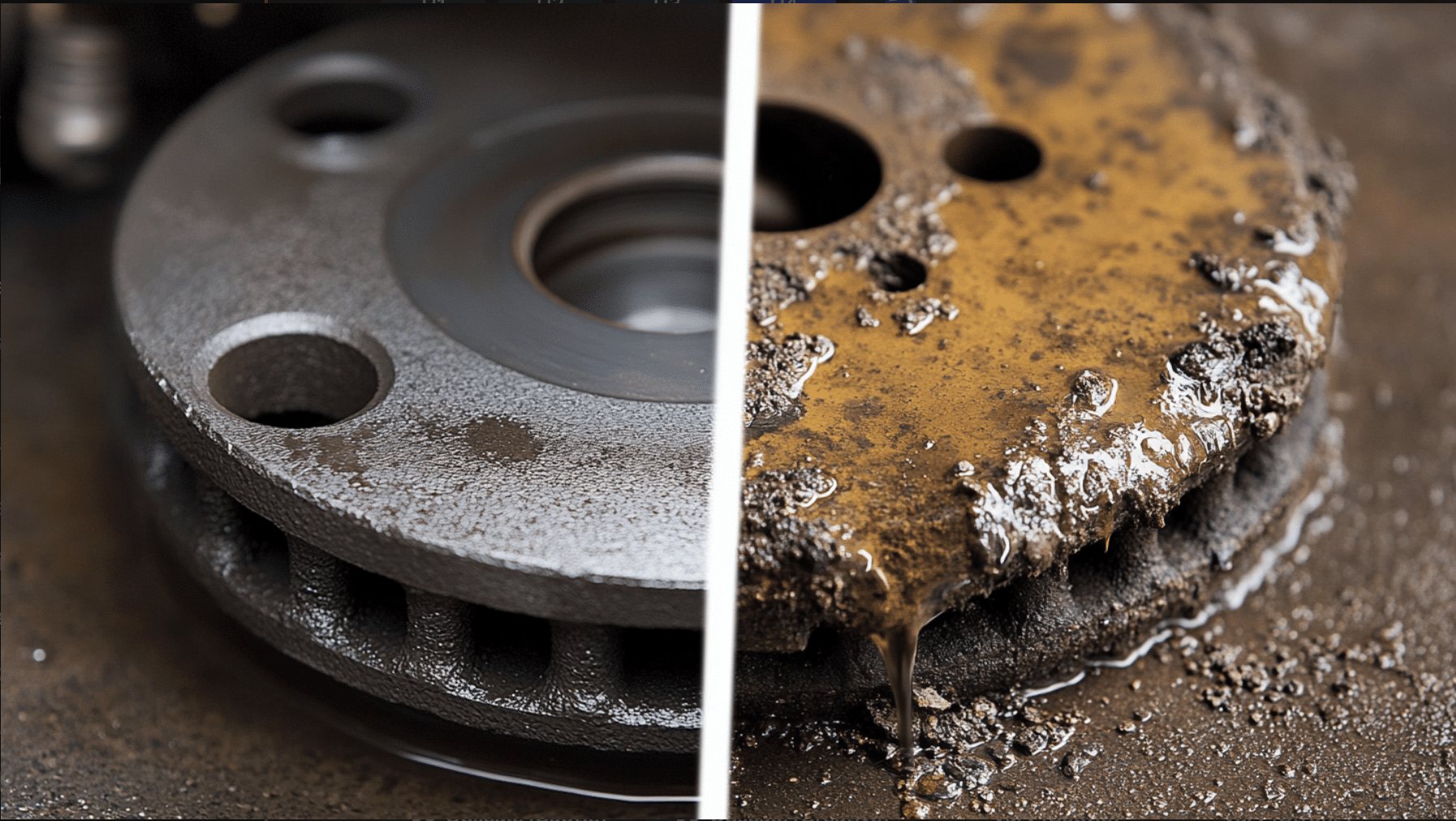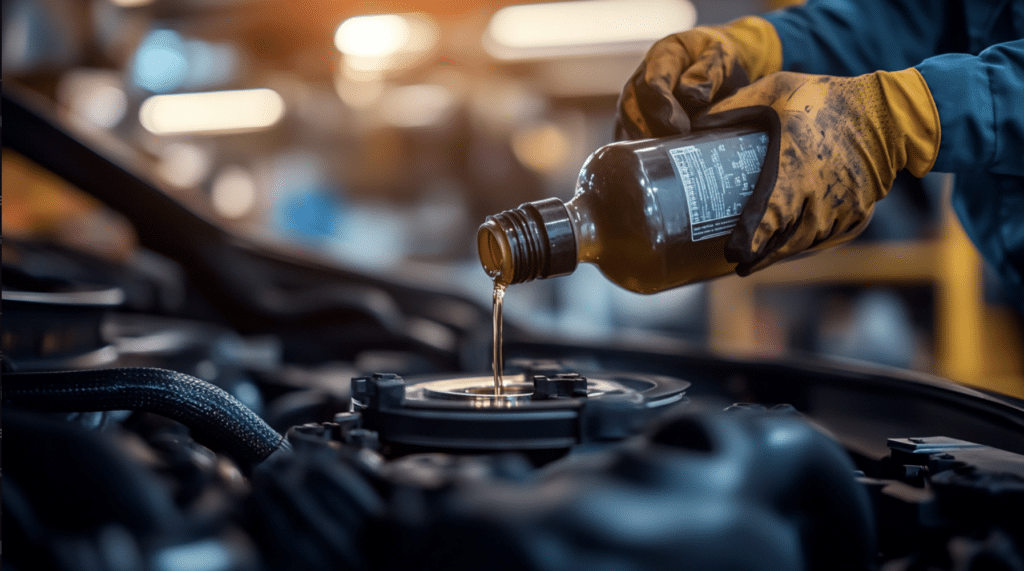Ever wondered why your mechanic insists on changing your brake fluid? You’re not alone.
Many car owners overlook this crucial maintenance task, putting their safety at risk.
Neglecting brake fluid changes can lead to reduced braking power and even complete brake failure.
But don’t worry – we’ve got you covered.
In this article, we’ll explain why regular brake fluid changes are essential for your vehicle’s performance and your safety on the road.
We’ll also break down the costs involved, so you know what to expect when it’s time for a brake fluid change.
By the end of this post, you’ll understand the importance of brake fluid maintenance, learn how often to change it, and get a clear picture of the brake fluid change cost.
Let’s dive in and keep your brakes in top shape.
Why Regular Brake Fluid Changes Matter

Brake fluid is the unsung hero of your vehicle’s braking system.
It’s easy to forget about this vital component, but understanding its importance can save you from costly repairs and potentially dangerous situations on the road.
Let’s explore why keeping your brake fluid fresh is crucial for your car’s performance and your safety.
Importance of Brake Fluid
- Ensures proper hydraulic pressure in the brake system.
- Prevents brake system failure by maintaining effective braking performance.
- Brake fluid plays a key role in your car’s stopping power.
- It transfers the force from your foot on the pedal to the brake pads, allowing your vehicle to slow down or stop.
- Without clean, effective brake fluid, this process can be compromised, putting you and others at risk.
Risks of Old Brake Fluid
- Accumulation of debris and moisture reduces braking efficiency.
- Increased risk of brake failure due to contaminated fluid.
- Over time, brake fluid can become contaminated with moisture and debris.
- This not only reduces its effectiveness but can also lead to corrosion within the brake system. Old, contaminated fluid might cause your brakes to feel spongy or even fail completely when you need them most.
Benefits of Regular Changes
- Enhances safety by ensuring responsive brakes.
- Prolongs the life of brake components.
- By changing your brake fluid regularly, you’re not just ensuring optimal braking performance – you’re also protecting the various components of your brake system from wear and tear.
- This can save you money in the long run by preventing costly repairs or replacements.
Remember, maintaining your brake fluid is a small price to pay for the peace of mind that comes with knowing your vehicle can stop safely and reliably whenever you need it to.
Signs Your Brake Fluid Needs Changing

Knowing when to change your brake fluid is just as important as understanding why it needs to be changed.
While following your vehicle’s maintenance schedule is a good start, there are several telltale signs that your brake fluid might need attention sooner.
Being aware of these indicators can help you avoid brake system issues and keep your vehicle running safely.
Spongy Brake Pedal: A common indicator of degraded brake fluid.
- If your brake pedal feels softer or more spongy than usual, it could be a sign that your brake fluid needs changing.
- This happens because air bubbles or moisture in the fluid reduce its ability to create the necessary pressure in the brake lines.
- When you notice this change in pedal feel, it’s time to have your brake fluid checked.
Brake System Warning Light: What it signifies and why it matters.
- Modern vehicles are equipped with warning lights to alert you of potential issues.
- If your brake system warning light comes on, it could indicate a problem with your brake fluid.
- This light might signal low fluid levels or contaminated fluid.
- Don’t ignore this warning – it’s your car’s way of telling you it needs attention.
Dark or Dirty Fluid: How to visually inspect brake fluid and determine its condition.
- Fresh brake fluid is typically clear or slightly yellow.
- Over time, it can become dark brown or even black due to contamination.
- You can visually inspect your brake fluid by looking at the reservoir under the hood.
- If the fluid looks dark or has visible debris, it’s likely time for a change.
- However, remember that looks can be deceiving – even if the fluid appears clean, it might still need changing based on its age or your vehicle’s mileage.
By keeping an eye out for these signs, you can ensure your brake fluid is changed when needed, maintaining your vehicle’s braking performance and your safety on the road.
Understanding the Cost of Brake Fluid Changes
Brake fluid changes are a crucial part of vehicle maintenance, but many car owners are unsure about the costs involved.
This section breaks down the expenses associated with brake fluid changes, helping you make an informed decision about whether to tackle the job yourself or seek professional help.
DIY Costs
- If you’re handy with tools, you might consider changing the brake fluid yourself.
- The main expense here is the brake fluid, which usually costs between $6 and $39 per quart. The type and quality of fluid affect the price.
- You’ll also need some basic tools. A turkey baster, wrench, and possibly a brake bleeding kit could add $20 to $50 to your total.
- While DIY can save money, be aware that mistakes could lead to costly repairs later.
Professional Service Costs
- Having a professional change your brake fluid typically costs between $80 and $130. This includes both labor and fluid.
- Labor charges vary based on the mechanic’s experience and location, usually ranging from $50 to $100 per hour.
- Some vehicles, especially luxury or high-performance models, might cost more due to complex brake systems.
Factors Affecting Cost
1. Vehicle Make and Model
- Your vehicle type can greatly impact the cost.
- Some cars need special, pricier brake fluids.
- Complex brake systems in certain vehicles may take longer to service, increasing labor costs.
2. Regional Labor Rates
- Where you live affects the price.
- Big cities often have higher labor rates than rural areas.
3. Shop Rates
- Different shops charge different rates.
- Dealerships are often pricier than independent mechanics but may offer additional benefits.
Cost vs. Safety
1. Value of Professional Service
- While DIY might seem cheaper, professional service ensures the job is done right, which is crucial for your safety.
- Proper maintenance can prevent costly repairs in the future.
2. Long-Term Savings
- Regular brake fluid changes, though a recurring expense, can save you money by preventing major brake system repairs.
Remember, when it comes to your brakes, cutting corners on maintenance could cost you more in the long run – both in terms of money and safety.
The Brake Fluid Replacement Process

Changing brake fluid might seem simple, but it’s a task that requires care and precision.
This section will walk you through the process, helping you understand why it’s often best left to professionals and what to consider if you’re thinking about doing it yourself.
Overview of the Procedure
- We are removing old fluid and replacing it with fresh, clean fluid.
- Importance of professional handling to avoid introducing air into the system.
- Replacing brake fluid involves more than just draining and refilling.
- The old, possibly contaminated fluid needs to be fully flushed out of the system.
- Then, new fluid is carefully added to ensure no air bubbles get trapped in the lines.
- Air in the brake lines can seriously reduce braking power, making proper technique crucial.
Why Hire a Professional?
- Expertise in using brake-flushing devices.
- We ensure the complete removal of contaminants and air from the brake lines.
- Professionals have specialized tools and know-how to do the job right.
- They use brake-flushing machines that can remove old fluid completely while preventing air from entering the system.
- They’re also trained to spot potential issues that might not be obvious to the untrained eye.
DIY Considerations
- Potential risks of DIY brake fluid changes and when to opt for a mechanic.
- While changing brake fluid yourself can save money, it comes with risks.
- Without proper tools and knowledge, you might introduce air into the system or fail to remove all the old fluid.
- This could lead to brake problems that are much more expensive to fix than the cost of professional service.
- If you’re not confident in your abilities or don’t have the right equipment, it’s best to leave this job to the experts.
Remember, your brakes are crucial for your safety. When in doubt, investing in professional service can give you peace of mind and potentially save you from costly mistakes.
Long-Term Maintenance and Safety
Keeping up with brake fluid changes is more than just a short-term fix—it’s an investment in your vehicle’s longevity and your safety on the road.
This section explores how regular maintenance can benefit you in the long run and why it’s a crucial part of responsible car ownership.
Recommended Intervals
- Every two years or 30,000 to 45,000 miles, depending on driving conditions.
- Most car makers suggest changing brake fluid every two years or between 30,000 to 45,000 miles, whichever comes first.
- However, these intervals can vary based on your driving habits and environment.
- If you often drive in stop-and-go traffic or live in a humid climate, you might need more frequent changes.
- Always check your owner’s manual for specific recommendations for your vehicle.
Impact on Vehicle Longevity
- How regular brake fluid changes contribute to overall vehicle health.
- Fresh brake fluid doesn’t just keep your brakes working well—it also protects your entire brake system.
- Clean fluid prevents corrosion in brake lines and other components, which can extend their lifespan and save you from costly repairs down the road.
- By maintaining your brake fluid, you’re helping to ensure your car stays reliable and safe for years to come.
Extended Warranties and Routine Maintenance
- The role of regular maintenance in keeping extended warranties valid.
- If you have an extended warranty on your vehicle, regular maintenance, including brake fluid changes, is often required to keep the warranty valid.
- Skipping these services could void your warranty, leaving you on the hook for expensive repairs.
- Keeping up with routine maintenance not only protects your car but also protects your wallet by ensuring your warranty remains in effect.
Remember, consistent care of your vehicle’s brake system is a small price to pay for the peace of mind that comes with knowing your car will stop when you need it to.
Regular brake fluid changes are a key part of this care, helping to keep you safe on the road and your vehicle in top condition for years to come.
Conclusion
Regular brake fluid changes are not just a routine maintenance task—they’re a crucial investment in your safety and your vehicle’s longevity.
We’ve explored why brake fluid degrades, the signs it needs changing, and the costs involved.
Remember, while the brake fluid change cost might seem like an extra expense, it’s far less than the potential cost of brake failure or extensive repairs.
So, what’s next? Take action to protect yourself and your vehicle.
Check your owner’s manual for the recommended brake fluid change interval, and if you’re due, schedule a service with a trusted mechanic.
Don’t wait for warning signs—proactive maintenance is key.

